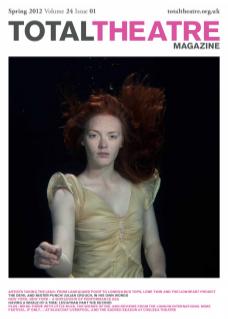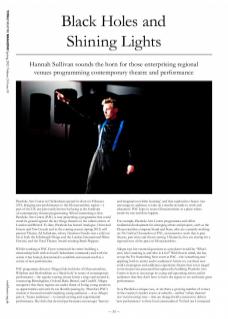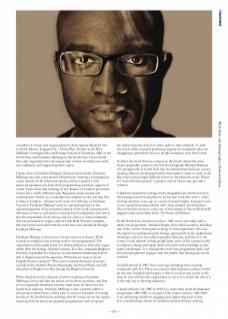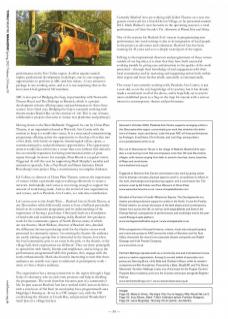Parabola Arts Centre in Cheltenham opened its doors in February 2011, bringing new performance to the Gloucestershire region – a part of the UK not previously known for being at the forefront of contemporary theatre programming. What’s interesting is that Parabola Arts Centre (PAC) is now presenting a programme that could stand its ground against the key fringe theatres in the urban centres of London and Bristol. To date, Parabola has hosted Analogue, Uninvited Guests and Tim Crouch and in the coming season (spring 2012) will present Theatre Ad Infinitum, whose Translunar Paradise was a sold out hit at both the Edinburgh Fringe and the London International Mime Festival, and the Total Theatre Award-winning Bunk Puppets.
Whilst working at PAC I have witnessed the centre building a relationship both with its local Cheltenham community and with the artists it has hosted, determined to establish and sustain itself as a centre of new performance.
PAC programme director Allegra Galvin thinks of Gloucestershire, Wiltshire and Herfordshire as a ‘black hole’ in terms of contemporary performance – the regular touring circuit forms a ring-road around it, connecting Birmingham, Oxford, Bath, Bristol, and Cardiff. Allegra recognises that these regions are under threat of losing young creatives as opportunities and activity are literally passing by. Therefore PAC’s mission is focused towards inspiring young audiences – or as Allegra puts it, ‘future audiences’ – to attend exciting and experimental performance. She feels that devised performance encourages ‘bravery and imagination within learning’, and that explorative theatre ‘can encourage its audience to take on a similar attitude to work and education’. PAC hope to recast Gloucestershire as a place where creativity can and does happen.
For example, Parabola Arts Centre programmes and offers residential development for emerging artists and projects, such as the Gloucestershire company Stand and Stare, who are currently working on The Guild of Cheesemakers at PAC, an immersive work that is part theatre, part wine and cheese tasting. Ultimately, they are aiming for a regional tour of the piece in Gloucestershire.
Allegra says her essential questions as a producer would be: ‘What’s new, who’s making it, and who is it for?’ With that in mind, she has set up the Try Something New event at PAC – the ‘something new’ applying both to artists and to audiences! Artists try out short new works-in-progress and audiences experience theatre that is not staged in the theatre but presented throughout the building. Parabola Arts Centre is keen to encourage its young and upcoming artists and its audiences that they don’t have to leave the region to see and make great performance.
So is Parabola a unique case, or are there a growing number of venues in the country’s market towns or suburbs – neither ‘urban theatres’ nor ‘rural touring’ sites – that are charged with a mission to deliver ‘new performance’ to their local communities? To find out I contacted a number of venues and organisations in other regions: Beaford Arts in North Devon, Triggered At / China Plate Theatre in the West Midlands, Carriageworks and Emerge festival in Yorkshire, ARC in the North East, and Farnham Maltings in the South East. I have found that each organisation has its unique take on how to tackle new work, new audiences, and supporting their region.
I spoke first to Farnham Maltings’ director Gavin Stride. Farnham Maltings are a few years ahead of Parabola in running a contemporary venue outside of the urban metropolis, and have gained a well-deserved reputation for both their programming and their support of artists. Gavin feels that working ‘in the shadow of London’ provincial venues have totally different rules. Regional venues cannot sell contemporary theatre to a contemporary audience in the way that this is done in London – this just won’t work in Colchester or Farnham. Crucial to Farnham Maltings’ work as a producing house is the acknowledgement of the potential context of the work: knowing who will want to hear it, and what it is saying. Gavin emphasises that this is also the responsibly of the artists, and says that it is often companies that are provincial in origin, such as Little Bulb Theatre Company, that have been successful with the work they have produced through Farnham Maltings.
Farnham Maltings is housed in a former brewery in Surrey. Work is made in residence, but existing work is also programmed. The organisation offers small grants for drama projects in their first stages under their No Strings Attached scheme. It is also, alongside Brighton Festival, responsible for Caravan, an international marketing festival that is shaped around the question, ‘What does it mean to be an English theatre company?’ This year’s national showcase of twenty curated artists includes Bryony Kimmings and Inua Ellams and will take place in Brighton in May during the Brighton Festival.
When asked about the selection of artists working at Farnham Maltings, Gavin said that the artists can be from anywhere, and that it’s not regionally restricted, but they must show an interest in the South East audience. Farnham Maltings is also a partner within a new project called House, which aims to ensure the health of touring theatre in the South East by working with 50 venues across the region, ensuring that the artists are properly programmed with an agreed fee (rather than the risky box office split so often offered). As well, the centre offers essential producing support for companies who are struggling to pitch their show to people and places they don’t know.
So that’s the word from two venues in the South: what’s the story from comparable venues in the North of England? Richard Bonham of Carriageworks in Leeds feels that the relationships between venues, creating effective producing models, have made it easier to make work. But what is increasingly difficult is how to distribute the work. Where to? And with what money? A project such as House may provide a solution.
A platform created by Carriageworks, Stage@Leeds and Severn Arts, the Emerge festival is the place to be for new Yorkshire artists. After starting out three years ago as a week of scratch nights, Emerge is now a year-round mentoring scheme with ‘shop window’ performances. One of the first shows to come out of this scheme is Naomi Rothwell’s puppetry and storytelling show, The Dreams of Philomina.
In the North East, Stockton-on-Tees’ ARC serves the valley with a multi-arts programme. Annabel Turpin, their chief executive, describes one of the venue’s main goals as being ‘to raise aspirations’. She says the region has undergone much change, particularly in the employment landscape, which in turn affects people’s lifestyles, and that ‘it is the venue’s social mission to help people make sense of the current world, to embrace change and equip them with skills and knowledge to face today’s challenges’. It is through the work they programme itself, and how that programme engages with the public, that these goals can be reached.
Annabel arrived at ARC three years ago, bringing many exciting companies with her. There was concern that audience numbers would be low, but Annabel’s philosophy is that if you don’t put on the work, then no one will have the opportunity to see it; it is worth the risk as it is the only way to develop audiences.
A major initiative for ARC in 2012 is to make their artist development programme ARCADE a core part of the venue’s activity. ARCADE is an interesting model for engaging and supporting local artists. It is a membership scheme for professional practitioners making performance in the Tees Valley region. It offers regular scratch nights, professional development workshops, one-to-one surgeries, opportunities to perform at ARC and free tickets. A very attractive package to any working artist, and so it is not surprising that on the last count it had gathered 140 members.
ARC is also part of Bridging the Gap, in partnership with Newcastle Theatre Royal and The Maltings in Berwick, which is a project development scheme offering space and performances in these three venues. In its third year, Bridging the Gap is currently working with theatre-maker Daniel Bye on the creation of Ash. This is one of many collaborative projects that aims to ‘create new platforms and pathways’.
Moving down to the West Midlands: Triggered At, run by China Plate Theatre, is an organisation based at Warwick Arts Centre with the mission to keep it a world-class venue. It is a structured commissioning programme offering artists the opportunity to develop a first idea into a first draft, with hands on support, dramaturgical advice, space, a commissioning fee, and performance opportunities. This opportunity attracts world-class artists into a venue that even without this initiative has an enviable reputation for luring international artists of great repute through its doors: for example, Peter Brook is a regular visitor. Triggered At will this year be supporting Mark Murphy’s aerialist and animation spectacle Take a Deep Breath and Shunt luminary David Rosenburg’s new project Ring, a sound journey in complete darkness.
Ed Collier, co-director of China Plate Theatre, stresses the importance of venues within a particular region working collectively to create a network. Individually each venue is not strong enough to support the amount of work being made. And so the arrival of new organisations and venues, such as Parabola Arts Centre, is a welcome contribution.
Let’s move now to the South West… Beaford Arts in North Devon, as any Devonshire wild child would, seems to have a brilliant personality based on its community programme and its understanding of the importance of having a good time. Obviously built on a foundation of hard work and excellent producing skills, Beaford Arts produces work for the community spaces of North Devon, many of which are not theatres. Mark Wallace, director of Beaford Arts, detailed the difference between producing work for the theatre versus work presented in community spaces: ‘on entering the theatre the audience are tacitly joining a group that is interested in the theatre, but when the local community goes to an event in the pub, or the church, or the village hall, their expectations are different’. They are there principally to spend time with family, friends and neighbours, and as long as the performances programmed fulfil this promise, they engage with the work enthusiastically. Mark also found it interesting to note that these audiences are usually very open to relational or participatory work – more so than a theatre audience.
The organisation has a strong connection to the region through a huge body of volunteers, who in each town promote and help in deciding the programme. The work therefore becomes part of a community’s life. In past seasons Beaford Arts have worked with Cartoon de Salvo with a rural tour of Pub Rock (in rural pubs); have programmed Laura Mugridge’s Running on Air set in a VW camper van, with the VW overlooking the Atlantic at Croyde Bay; and presented Wonderbar’s Small Space in a village kitchen.
Currently Beaford Arts are working with Kilter Theatre on a new sitegeneric rural work for a North Devon Village, to be presented autumn 2012. Mark Wallace’s own favourite in the upcoming season is a rural performance of Chris Goode’s The Adventures of Wound Man and Shirley.
One of the reasons for Beaford Arts’ success in programming new performance into rural settings is due to its integration of local people in the project as advocates and volunteers. Beaford Arts has been running for 45 years and so is a deeply rooted part of the region.
Talking to the inspirational directors and programmers of these venues outside of our big cities, it is clear that they have built successful working models by giving care and attention to the quality of the work presented – through their knowledge of and engagement with their local community; and by nurturing and supporting artists both within their region and from further afield, nationally or internationally.
The venue I am currently working with, Parabola Arts Centre, is just a year-old, so on the very beginnings of its journey, but it has already made a sound start in all of the above, and is hopefully set to join its more established peers as a flag on the map for anyone with a serious interest in contemporary theatre and performance.
Opened in October 2009, Parabola Arts Centre supports emerging artists in the Gloucestershire region, concentrating on work that stretches the definitions of theatre, music and dance. Later this year PAC will host performances by Analogue, Inua Ellams, Chris Goode, and Lost Dog, among others. www.parabolaartscentre.co.uk
Run out of Greenwarren House in the village of Beaford, Beaford Arts operates a rural touring circuit that encompasses more than 30 local Devonshire villages, with venues ranging from halls to ancient churches, barns, beaches, clifftops and sand dunes. www.beaford-arts.org.uk
Triggered at Warwick Arts Centre commissions new work by giving artists time to develop concepts, physical space to work in, an audience to reflect on the work, dramaturgical and producing support, and a commission fee. The scheme is led by Ed Collier and Paul Warwick of China Plate. www.warwickartscentre.co.uk / www.chinaplatetheatre.com
Situated at the heart of Leeds’ Millennium Square, The Carriageworks is a theatre providing extensive support to artists in the North. It runs the Freshly Picked initative, an annual showcase of the best physical and contemporary theatre from across the UK, as well as (with stage@leeds and Seven) the Emerge festival, a programme of performances and workshops tied to the yearround Emerge Leeds platform. www.carriageworkstheatre.org.uk / www.emergeleeds.co.uk
With a programme of live performance, cinema, visual arts and participatory and community projects, ARC serves the whole of Stockton and the Tees Valley. At present the venue’s two associate theatre companies are Rabbit Damage and Vivid Theatre Company. www.arconline.co.uk
Farnham Maltings operates both as a community arts and entertainment venue and as a creative organisation. Among its current stable of associate companies are Dancing Brick, Little Bulb and Ockham’s Razor, while its resident companies are Max Humphries, Pursued by a Bear, StopGAP, and The Dance Movement. Farnham Maltings is also one of the hosts for the Puppet Centre’s Puppets About residency and runs the Caravan showcase alongside Brighton Festival. www.farnhammaltings.com / www.caravanshowcase.org.uk



